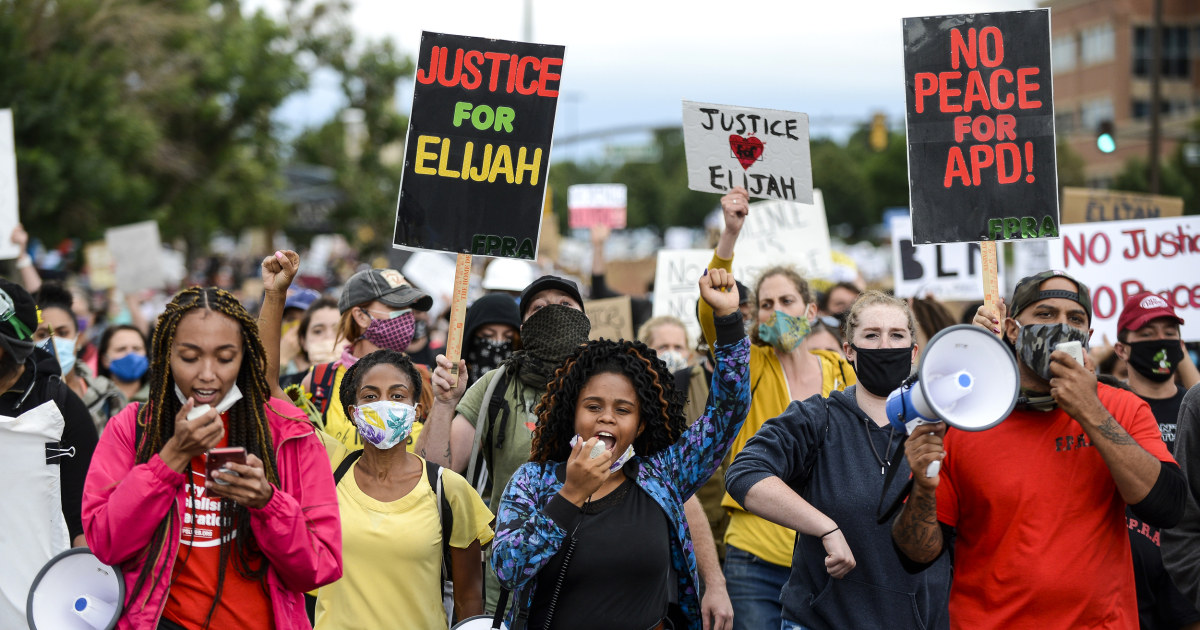So cities and counties will continue to pick up the costs for abusive police behavior unless local officials rule that an officer was not acting, as the legislation says, under “reasonable belief that the action was lawful.”
Christensen said Steamboat Springs, a ski resort town in the Rocky Mountains, plans to have the city manager and city attorney review his recommendation as to whether an officer acted in good faith. If they don’t agree, city officials can override his decision.
“Each community has to figure this out for themselves,” said Christensen who, along with police union leaders, negotiated the bill’s language with lawmakers. The officer payment is capped at $25,000 rather than the $100,000 lawmakers originally sought.
Christensen said he doesn’t think the new legislation will deter problematic officers from unnecessary violence. “Bad cops are bad cops,” he said. “They already have policies that they don’t follow, they already have training that they are not willing to follow. They don’t give a hoot, and they don’t care about the money.”
In Denver, the “good faith” question will go to the head of the city’s Department of Public Safety, which oversees the police. The decision will be “based on the facts and circumstances of each case,” said Kelli Christensen, the agency’s spokeswoman, who is not related to Chief Christensen.
In Greenwood Village, a wealthy suburb south of Denver, officials announced they would shield any of the city’s cops from personally paying a lawsuit tab; the new law leaves the decision on whether individual officers pay in local hands. A spokeswoman declined to comment, but referred to the city’s explanation on its website.
“Incurring a financial penalty decided by a City Council potentially influenced by media and passions of the day is a far greater risk than many of our police officers are willing to take,” the statement said. “The principle behind such penalties can destroy the will of our officers to serve the people that they have sworn to protect.”
The legislation took effect on Sept. 1. This month, lawyers expect to file the first lawsuit under the new law, alleging Aurora police used excessive force when ordering a mother and her four children on the ground at gunpoint earlier this year.
Colorado state and city government officials said it’s still too soon to tell how many cops could be forced to pay victims or leave the profession for bad behavior.
Denver’s Assistant City Attorney Wendy Shea told a policing think tank that the city may become more likely to settle abuse complaints against officers rather than risk taking these cases to court. “Essentially they lose their job if we take it to trial and lose,” Shea told The Police Executive Research Forum in Washington. Through a spokesman, Shea declined to comment.
The nation’s largest police union, the Fraternal Order of Police, said the organization supports the idea of decertifying bad cops if there’s evidence to back it up.
But Rob Pride, a Colorado police sergeant who is the highest ranking Black member within the national union, said he opposed stripping away qualified immunity as a defense for cops.
“People think that police officers have a free reign to do whatever they want and they are not held accountable; that’s not what it means,” he said. “It does not prevent police departments from firing officers.”
Police-union members in Colorado voted to raise dues to pay into a legal defense fund to help cover the costs of any upcoming payouts, Pride said.
Prymus Insurance in Texas asked Deborah Ramirez, a law professor and police-accountability expert at Northeastern University’s law school in Massachusetts, to analyze how much personal liability insurance should cost for cops in Colorado. Her law students are building a database of payouts for police cases based on records from the state’s five biggest cities.
“We can’t price the risk if we don’t know what the risk is,” said Jeff Harrison, Prymus’s CEO.
The policies could flag problem officers, he added. “We will have the ability to raise rates and make someone uninsurable,” he said.
New York City spent more than $220 million on police liability claims in the 12 months that ended in July 2019, according to the city’s comptroller’s office. In Chicago, police misconduct cases cost the city more than $113 million dollars in 2018, based on an analysis by the Chicago Reporter.
Joanna C. Schwartz, a qualified immunity scholar and UCLA law professor, found that local governments paid 99.8 percent of payments in police civil rights cases. Schwartz examined a sample of about 9,200 cases across the country over a six-year period ending in 2011.
Inspired by Colorado, a dozen state legislatures have considered ways to make cops more accountable for bad behavior. Lawmakers in Massachusetts passed a slew of police reforms in early December, including a narrow change to qualified immunity. But the Republican governor rejected the bill after police unions took out ads in local papers saying the changes would harm policing.
So far, only Connecticut has passed a new law. As of July 2021, police officers there will have to pay for their own lawsuits, and related damages, if a court decides that the officer engaged in a “malicious, wanton or wilful act.”
But right before signing the bill into law, Gov. Ned Lamont told reporters: “Qualified immunity is in place for the vast majority of anything a cop could be doing.” Lamont described the chance of an officer having to pay for a lawsuit as “incredibly rare.”
In New York, state Sen. Alessandra Biaggi introduced a bill this summer requiring that local cops carry personal liability insurance. If cash-strapped local governments “are still being forced to pay out police misconduct cases, we are going to bankrupt municipalities,” said Biaggi, a Democrat.
In response, the NYPD patrol officers union tweeted that Biaggi wants to “make policing such an unattractive profession that nobody will do it.” Her bill has stalled in New York’s legislature.
Colorado’s law won’t help Elijah McClain’s family. In August, Newman filed a lawsuit on their behalf in federal court, where qualified immunity remains a defense.
The lawsuit alleges that although McClain wasn’t suspected of any crime, he died after police used deadly force on him and paramedics injected him with a massive dose of the sedative ketamine. Some of the officers were fired after returning to the scene of McClain’s death and taking mocking selfies. Yet if the court doesn’t find there’s an established case where similar actions are deemed unconstitutional, the officers may not be held accountable in federal court.
The City of Aurora has announced plans for reforms after intense public criticism of its actions in McClain’s death. But in its legal filings, the city is arguing that its employees are protected by qualified immunity so the family’s lawsuit should be dismissed.

